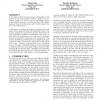Free Online Productivity Tools
i2Speak
i2Symbol
i2OCR
iTex2Img
iWeb2Print
iWeb2Shot
i2Type
iPdf2Split
iPdf2Merge
i2Bopomofo
i2Arabic
i2Style
i2Image
i2PDF
iLatex2Rtf
Sci2ools
114
Voted
EMSOFT
2010
Springer
2010
Springer
Reducing stack with intra-task threshold priorities in real-time systems
In the design of hard real-time systems, the feasibility of the task set is one of the primary concerns. However, in embedded systems with scarce resources, optimizing resource usage is equally important. In particular, the RAM is highly expensive in terms of chip space, and it heavily impacts the cost of the final product. In this paper, we address the problem of reducing the stack usage of a set of sporadic tasks with timing and resource constraints, running on a uni-processor system. With respect to other approaches available in the literature, this work considers each task consisting of a set of functions (or subjobs), each characterized by a maximum stack requirement. This makes it possible to prohibit arbitrary preemptions through a dynamic priority protocol that reduces the overall system stack usage. Resource synchronization is also considered and, an extension of the Stack Resource Policy is presented to arbitrate the access to mutually exclusive resources while reducing the ...
Related Content
| Added | 11 Feb 2011 |
| Updated | 11 Feb 2011 |
| Type | Journal |
| Year | 2010 |
| Where | EMSOFT |
| Authors | Gang Yao, Giorgio C. Buttazzo |
Comments (0)

